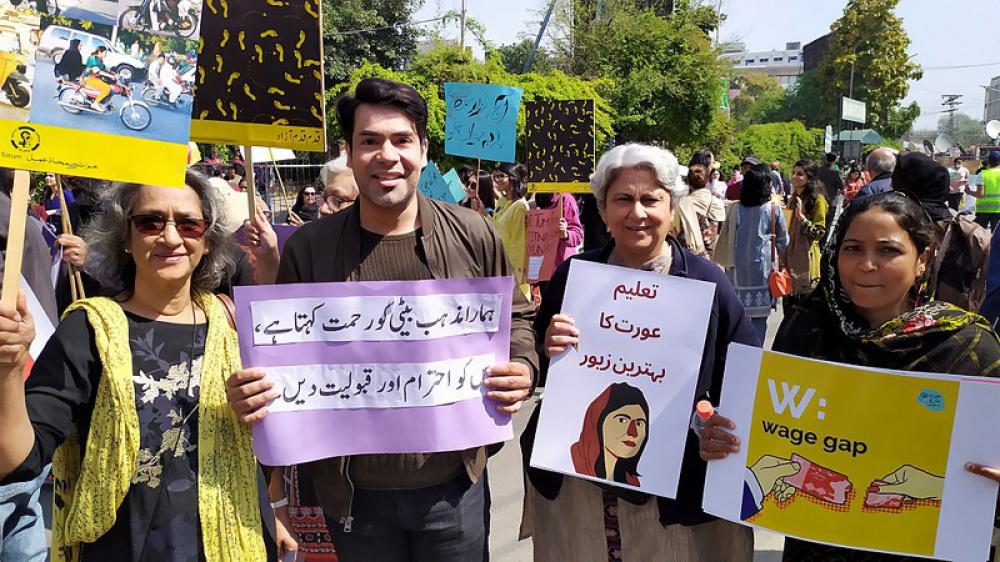Just Earth News | @justearthnews | 14 Mar 2023

Wikipedia Commons
Patriarchal dominance in Pakistan saw its ugly side again when women in the country were asserting their rights in the wake of International Women’s Day.
Pakistani women holding rallies for their rights and seeking protection from gender violence and sexual harassment were ridiculed, and even beaten by police.
The government authorities did not grant permission for these peaceful rallies until the courts intervened.
The male-dominated society of Pakistan, which is highly influenced by radical Islamist teachings, has caused widespread exploitation of women among all age groups.
The demand for women's empowerment and gender equality is often termed anti-Islamist.
Around 63,000 cases of gender-based violence were recorded in the past three years in Pakistan. According to Pakistan's Human Rights Commission, 80 per cent of these complaints were about domestic violence and 47 per cent were related to domestic rapes where married women experienced sexual abuse.
About 90 per cent of Pakistani women are reported to have faced the brunt of domestic violence at least once in their lifetime and 50 percent of them ignore them.
What is more shocking is just 0.4 per cent of these women go to court.
“Our society is layered with patriarchy, and it subjugates women through a series of institutional, social, and cultural norms that allow and normalise violence against women,” said Pakistani minister Senator Rehman.
Pakistani women have been holding ‘Aurat March’ every year since 2018 to express their anguish, and to seek protection and equal status. However, there has been fierce opposition from a major section of Pakistani society. Even government authorities opposed the march. Curfew was imposed in some places. Lahore court had to
intervene and allowed these marches.
However, police authorities tried to stop the rallies and beat women participants. Even religious extremists reportedly attacked the Aurat march. It led to widespread criticism. Human Rights Commission slammed police authorities for the use of force. “We are also concerned by reports that religious organizations have tried to hinder women from taking part in the march. Women have as much right to peaceful assembly as any citizen,” it tweeted.
Aurat March was held in the big cities of Islamabad, Lahore, Karachi, Hyderabad, and Multan. Women raised slogans against sexual exploitation, and domestic violence, and in support of women's empowerment, and equality. “We speak of socialist feminism. We speak of democracy. We speak of anti-enforced disappearances. We speak of equality and access to public spaces for women. These are the reasons why the state will always have a problem with us,” said Imaan Zainab Mazari-Hazir, one of the organisers in Islamabad.
The critics say the placards held during Aurat March talk about divorce, sexual harassment and menstruation, which they say disrespect the religious and cultural sensitivities of the Muslim nation.
In 2020, a group of hardliners hurled stones at the women attendees of the Aurat March. Even this year, the Aurat March received criticism. “Don't let these kinds of agenda to ruin our Islamic values and culture,” said one Twitter user.
The male- dominated society is said to have no qualms about seeking control over bodies and seeing women as a tool of sex. Patriarchal dominance runs deep in Pakistani society. Even some male journalists were seen questioning the ‘Aurat March’. Now, many Pakistani women are trying to wrest control of their sexuality from men. “For me, the Aurat March is one day of the year where I can talk about what I feel,” said Islamabad- based lawyer Maryam Fatima.
The 2020 report of the Global Gender Gap Index shows gender inequality is a big problem in Pakistan despite it being one of the largest countries with a young population. It ranked 145th in the world when it comes to economic participation and equality for women.
While every successive government in Pakistan made tall claims of women's empowerment, different reports suggest women were never given due access to resources and their rights.11 Thomas Reuters Foundation poll in 2018 showed Pakistan was the sixth-most dangerous country for women.
“Women are equal citizens and the state is required to protect their rights but the state is complicit,” said activist Roshane Zafar.
Women in Pakistan believe that their empowerment will not be possible if they rely on the legislature or judiciary systems of the country, but through moments like Aurat March.